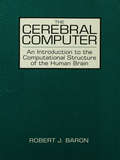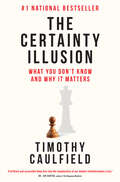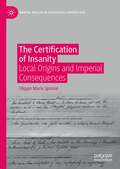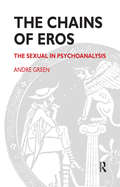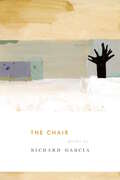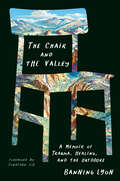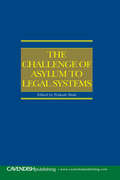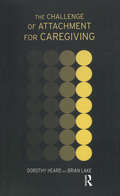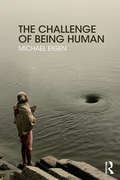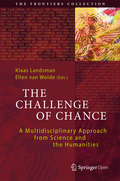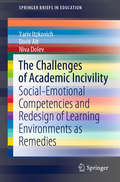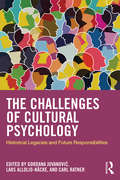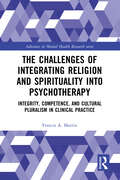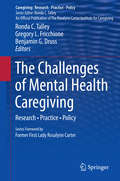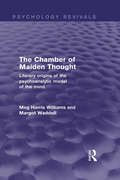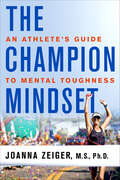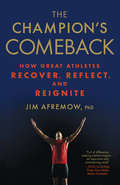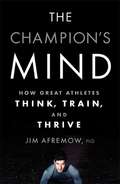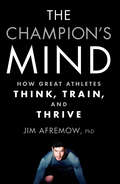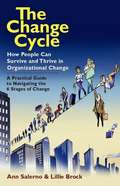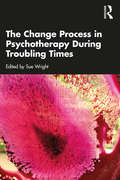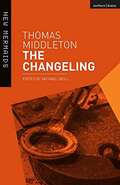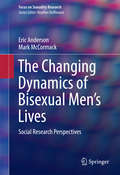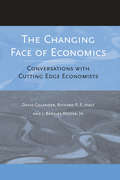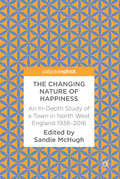- Table View
- List View
The Cerebral Computer: An Introduction To the Computational Structure of the Human Brain
by Robert J. BaronViewing the human brain as "the most complex and powerful computer known," with a memory capacity and computational power exceeding the largest mainframe systems, Professor Baron sets the groundwork for understanding the computational structure and organization of the human brain. He provides the introductory framework necessary for this new and growing field of investigation and he discusses human vision, mental imagery, sensory-motor functions, audition, affect and behavior.
The Certainty Illusion: What You Don't Know and Why It Matters
by Timothy CaulfieldIn a world where there is so much conflicting information about how we are supposed to live, what can we really know?Knowing the truth, what&’s real from what&’s fake, should be easy. In today&’s world, that&’s far from the case. In The Certainty Illusion, Timothy Caulfield lifts the curtain on the forces contributing to our information chaos and unpacks why it&’s so difficult—sometimes even for experts—to escape the fake.Whether it&’s science, our own desire to be good and do the right thing, or the stories and opinions of others, there&’s more to sussing out the truth than simply tracking down what feels like an authoritative source. Caulfield argues that these major forces—science, goodness, and opinion—drive beliefs and behaviour, but the ways that they can be corrupted, or worse, used to nefarious ends by bad actors, are endless.While it may feel, at times, as though we are circling the drain of truth, especially as new technologies make it even easier to spread dangerous fictions, Caulfield pulls us out of the vortex and keeps us afloat, helping us recognize and combat the forces that threaten to pull us under.
The Certification of Insanity: Local Origins and Imperial Consequences (Mental Health in Historical Perspective)
by Filippo Maria SposiniThis book represents the first systematic study of the certification of lunacy in the British Empire. Considering a variety of legal, archival, and published sources, it traces the origins and dissemination of a peculiar method for determining mental unsoundness defined as the ‘Victorian system’. Shaped by the dynamics surrounding the clandestine committal of wealthy Londoners in private madhouses, this system featured three distinctive tenets: standardized forms, independent medical examinations, and written facts of insanity. Despite their complexity, Victorian certificates achieved a remarkable success. Not only did they survive in the UK for more than a century, but they also served as a model for the development of mental health laws around the world. By the start of the Second World War, more than seventy colonial and non-colonial jurisdictions adopted the Victorian formula for making lunacy official with some countries still relying on it to this very day. Using case studies from Europe, the Americas, and the Pacific, this book charts the temporal and geographical trajectory of an imperial technology used to determine a person’s destiny. Shifting the focus from metropolitan policies to colonial dynamics, and from macro developments to micro histories, it explores the perspectives of families, doctors, and public officials as they began to deal with the delicate business of certification. This book will be of interest to scholars working on mental health policy, the history of medicine, disability studies, and the British Empire.
The Chains of Eros: The Sexual in Psychoanalysis
by Andre GreenGreen deplores the absence of sexuality and the erotic from current psychoanalytic theory and practice. Instead, he demonstrates how human sexuality forms an ‘erotic chain’. The work of analysis, he argues, consists in following the dynamic movements of the erotic process, by ascertaining its links with other aspects of the psyche.
The Chair
by Richard GarciaOne of America's foremost prose poets, Richard Garcia's The Chair simultaneously takes place in the natural world and a speculative world rich in the fabulist tradition: historical figures roam like ghosts, time is pulled and twisted, and narrative spins effortlessly out of language. A core of autobiography grounds these poems that are rife with surprises uniting the mythic and the everyday.Richard Garcia's awards include an NEA, a Pushcart Prize, and the American Poetry Journal Book Prize. He teaches creative writing in the Antioch University Los Angeles Low-Residency MFA program and lives on James Island, South Carolina.
The Chair and the Valley: A Memoir of Trauma, Healing, and the Outdoors
by Banning LyonAn incredible memoir about one man's journey to heal from trauma through chosen family, friendship, and nature.AN OPEN FIELD PUBLICATION FROM MARIA SHRIVERBanning Lyon was an average 15-year-old, living in Dallas, TX. He enjoyed skateboarding, listening to punk rock, and even had a part-time job. But in January 1987 his life quickly changed after a school guidance counselor falsely believed he was suicidal after giving away his skateboard. Days later he was admitted to a psychiatric hospital, and what he was told would be a two-week stay turned into 353 days that would change his life forever.Banning takes readers through his fraught relationship with his family, the mistreatment he suffered at the hospital, the lawsuit against the owners of the facility, and his desire to make sense of what happened to him. We witness Banning navigate the difficult landscape of trauma and his daily battle to live a normal life. After years of highs and lows that include being adopted by his attorney and mentor, falling in love and grieving the death of his fiancée, and being sued by the same doctors who mistreated him, Banning decides to take control of his life and finds hope in the backcountry of Yosemite National Park, where he discovers new purpose in being a backpacking guide. Through friendship, nature, and eventually giving therapy another chance, Banning summons the courage to keep moving forward.The Chair and The Valley is a raw, gut-wrenching, and amazing story about healing from trauma and starting over. It is a exploration of the importance of chosen family, the restorative power of nature, and the strength it takes to build a new life in the face of fear and doubt.
The Challenge of Asylum to Legal Systems
by Prakash ShahA collection of papers presenting critical perspectives in the development of asylum law with a focus on European and UK developments, incorporating international human rights law and comparative law perspectives. Issues covered range from law-making at the EU level, with a particular focus on extra-territorial processing of refugees claims, asylum procedures, family members of those in need of protection, welfare benefits and impact of national level on the reception of EU norms. Domestic and comparative perspectives offered include discussions on detention, judicial decision-making, appeal rights, claims processing with particular reference to the role of interpreters and developments in Australia which have provided a model of thought worthy of emulation in the UK.
The Challenge of Attachment for Caregiving
by Dorothy Heard Brian LakeThe Challenge of Attachment for Caregiving describes a theoretical model for the development of caregiving that complements and also extends attachment theory. The model highlights the conditions under which adult caregivers can remain in a state of arrested development, impairing their own ability to give care and resulting in attachment problems for those who seek care from them. It shows how insecure attachment in childhood and adolescence impedes the development of caregiving and how, in times of crisis, even securely attached individuals need appropriate support in order to sustain their capacity to give effective care. Constructing a systemic model of the self, the authors place the instinctive systems for caregiving and careseeking (attachment) within a theory that relates them to other systems of the self, such as the systems for sharing interests, sexuality and for self-defence. The model describes the interplay between these goal-corrected behavioural systems. Because it includes the defensive mechanisms and strategies which an individual values most, it is particularly helpful to the therapist in understanding the interpersonal processes between people who are seeking to influence each other’s behaviour. It is presented in a form that enables the therapist to formulate hypotheses about a client’s predicament and their way of relating to the therapist and then explore and test these hypotheses in the course of therapy. Drawing on many years’ experience as clinicians and researchers, Dorothy Heard and Brian Lake explore in depth an aspect of human development which has profound implications for our future survival. Presenting its own challenge to both theory and practice, this book offers students and practitioners a new perspective on attachment.
The Challenge of Being Human
by Michael EigenFreud wrote that the greatest problem facing humanity is its destructive urge. There is no one factor that solves the issue. The Challenge of Being Human explores tendencies that make us up and capacities that try to meet them. The shock of ourselves is perennial. We are challenged by our own aliveness and a need to open doors as yet unknown. We are not done evolving, growing, learning, feeling, caring. Growth of capacity to tolerate and work with experience is part of our evolutionary challenge. This book seeks to support us in whatever ways we can begin to meet this challenge.
The Challenge of Chance: A Multidisciplinary Approach from Science and the Humanities (The Frontiers Collection)
by Klaas Landsman Ellen WoldeThis book presents a multidisciplinary perspective on chance, with contributions from distinguished researchers in the areas of biology, cognitive neuroscience, economics, genetics, general history, law, linguistics, logic, mathematical physics, statistics, theology and philosophy. The individual chapters are bound together by a general introduction followed by an opening chapter that surveys 2500 years of linguistic, philosophical, and scientific reflections on chance, coincidence, fortune, randomness, luck and related concepts. A main conclusion that can be drawn is that, even after all this time, we still cannot be sure whether chance is a truly fundamental and irreducible phenomenon, in that certain events are simply uncaused and could have been otherwise, or whether it is always simply a reflection of our ignorance. Other challenges that emerge from this book include a better understanding of the contextuality and perspectival character of chance (including its scale-dependence), and the curious fact that, throughout history (including contemporary science), chance has been used both as an explanation and as a hallmark of the absence of explanation. As such, this book challenges the reader to think about chance in a new way and to come to grips with this endlessly fascinating phenomenon.
The Challenges of Academic Incivility: Social-Emotional Competencies and Redesign of Learning Environments as Remedies (SpringerBriefs in Education)
by Yariv Itzkovich Dorit Alt Niva DolevThe book introduces readers with theory and empirical findings related to uncivil behaviour in academic settings and discusses its precursors, implications and remedies. In the first part, we define academic incivility, its manifestations and dimensions, while distinguishing between academic incivility and workplace incivility. We then discuss the prevalence of faculty incivility (FI) and students’ incivility (SI) in academic settings and focus on the dyadic relationships between faculty and students in the broader context of incivility in academia, with an added focus on faculty incivility.The second part introduces the main contributors to academic incivility. Personal factors, in this case, social-emotional competencies, and contextual factors, in this case, learning environments, are explored by combining up-to-date research data, personal stories and interviews with lecturers and students. A deep understanding of the precursors of academic incivility is critical to the examination of possible coping strategies within academic settings and elsewhere.In the third part, we explore the potential and practical remedies that can mitigate incivility in academic settings and, in particular, the enhancement of emotional and social competencies and the modification of learning environments.
The Challenges of Cultural Psychology: Historical Legacies and Future Responsibilities
by Carl Ratner Gordana Jovanović Lars Allolio-NäckeThis book considers cultural psychology from historical, theoretical, and epistemological perspectives, building an understanding of cultural psychology as a human science and moving beyond the nature-culture dichotomy. The unique collection of chapters seeks to advance the field of cultural psychology by reviving its historical legacies and arguing for its social responsibility in future historical developments. <P><P>It considers European legacies for cultural psychology as developed by leading figures such as Giambattista Vico, Wilhelm Wundt, Wilhelm Dilthey, and Ernst Cassirer in order to provide insights into a long tradition of thinking from a cultural psychology perspective. The book discusses historical pathways in the rise and repression of cultural psychology and its different historical forms, arguing for the necessity of decolonizing psychology, securing a place for culture in it, and developing an epistemology suited to humankind’s meaning-making processes in mutual shaping of psyche and culture. It provides an integrative and historical understanding of the subject and uses the diversity and heterogeneity within the field to offer critical reflections on its achievements. The thoroughly international group of contributors brings diverse analyses of self, body, emotions, culture, and society and considers the future of cultural psychology. <P><P>The volume is a stimulating read for scholars and students of cultural and theoretical psychology and related areas including philosophy, anthropology, and history.
The Challenges of Integrating Religion and Spirituality into Psychotherapy: Integrity, Competence, and Cultural Pluralism in Clinical Practice (Advances in Mental Health Research)
by Francis A. MartinThis book examines personal and professional understandings of religion in psychotherapy and advocates for integrity, competency, and cultural pluralism in clinical practice.A major feature of this book is that it confirms the massive proliferation of religion-oriented approaches to counseling and therapy in recent years. It attributes this rise to opportunism and exaggerated individualism among therapists and to the frequent failures of professional associations, clinical preparation programs, and other influences. In response to these influences, it identifies the need for guiding principles for integrating religion into therapy, discusses the religious issues that clients bring to therapy, and advocates for major changes in clinical practice, with emphasis on integrity and competence. Building on a large volume of research and using evidence-based conclusions, it clarifies how these two major features of contemporary life can be integrated with integrity and competence. The author maintains that religion should be a feature of the practice of counseling and therapy, so long as it addresses the clinically relevant needs of clients. However, it also explores how the religion of counselors and therapists often expresses the needs of counselors and therapists, instead of addressing the needs of their clients.In the context of these questions and discussion of contentious challenges, this book provides guidelines for relating religion with clinical practice and recommends needed actions by clinical preparation programs, professional associations, individual therapists, state legislatures, licensing boards, social service agencies, and corporations. All of this stands on the conspicuous need for professional accountability in the delivery of mental health care.
The Challenges of Mental Health Caregiving
by Ronda C. Talley Gregory L. Fricchione Benjamin G. DrussCaring for the ill, disabled, very old, or very young requires a labor-intensive commitment that is not only essential to the well-being of individuals and to society as a whole, but also fraught with physical, financial, and psychological risks. And despite the critical nature of their job, caregivers rarely have avenues of support. The Challenges of Mental Health Caregiving addresses the complexities of the situation with uncommon depth and breadth. Suited to researchers, scientist-practitioners and clinicians, and students seeking a rounded understanding of the field, it examines how caregiving affects the lives, work, and mental health of family and professional caregivers. Chapters explore developmental, cultural, and spiritual contexts of care, addressing ongoing concerns about care in relation to larger health systems and emphasizing the need for care to be viewed as a community, rather than an individual or family experience. Further, the book's conclusion strongly advocates for more effective and efficient uses for available funds and resources while offering workable proposals for service improvements at the policy level. Key areas of coverage: The impact of caregiving on physical and mental health. Integrating mental health and primary care. The promotion of positive mental health outcomes in children and youth. Mid-life concerns and caregiver experience. Loss, grief, bereavement and the implications for mental health caregiving. Policy issues in caregiving and mental health. The Challenges of Mental Health Caregiving is a clear-sighted reference for researchers, clinicians and scientist-practitioners, and graduate students in the caregiving fields, including clinical psychology, social work, public health/medicine, geriatrics/gerontology, public policy, and educational policy.
The Chamber of Maiden Thought: Literary Origins of the Psychoanalytic Model of the Mind (Psychology Revivals)
by Margot Waddell Meg Harris WilliamsLiterature is recognised as having significantly influenced the development of modern psychoanalytic thought. In recent years psychoanalysis has drawn increasingly on the literary and artistic traditions of western culture and moved away from its original medical–scientific context. Originally published in 1991 The Chamber of Maiden Thought (Keats's metaphor for 'the awakening of the thinking principle') is an original and revealing exploration of the seminal role of literature in forming the modern psychoanalytic model of the mind.The crux of the 'post-Kleinian' psychoanalytic view of personality development lies in the internal relations between the self and the mind's 'objects'. Meg Harris Williams and Margot Waddell show that these relations have their origins in the drama of identifications which we can see played out metaphorically and figuratively in literature, which presents the self-creative process in aesthetic terms. They argue that psychoanalysis is a true child of literature rather than merely the interpreter or explainer of literature, illustrating this with some examples from clinical experience, but drawing above all on close scrutiny of the dynamic mental processes presented in the work of Shakespeare, Milton, the Romantic poets, Emily Bronte and George Eliot.The Chamber of Maiden Thought will encourage psychoanalytic workers to respond to the influence of literature in exploring symbolic mental processes. By bringing psychoanalysis into creative conjunction with the arts, it enables practitioners to tap a cultural potential whose insights into the human mind are of immense value.
The Champion Mindset: An Athlete's Guide to Mental Toughness
by Joanna ZeigerAn in-depth mental motivational book for all athletes from Olympian Dr. Joanna Zeiger that offers game-changing strategies for programming your brain to achieve physical excellence.Champions, as the familiar adage preaches, are not born—they're made. Reaching the top of any sport, or any aspect of life, takes years upon years of dedication and proper preparation. But if there's a huge pool of individuals who have undertaken the same commitment and steps towards becoming the best, what truly separates the winners from everyone else? Joanna Zeiger believes proper mental preparation is the answer. The Champion Mindset is a much-needed and long overdue look into how to program a competitor's mind to achieve optimal success. Changing behaviors and ways of thinking are never easy, but the chapters in this book aim to simplify this process to make it manageable and achievable. This book is for every athlete—from the weekend warrior, who wants to complete in his or her first 5k running race, to those who have aspirations of one day becoming Olympians and world champions.The Champion Mindset is a compendium of Zeiger's own personal journey from struggling novice swimmer to Olympian and World Champion. Through steps including: Proper Goal Setting, Keeping it Fun, Building Your Team, Intention in Training, Improving Motivation, Promoting Self-Confidence, and Mind/Body Cohesion, among others, Zeiger uses her decades of personal experience, doctoral-level research, and professional success, to prepare readers to go all-in with their mental game.
The Champion's Comeback: How Great Athletes Recover, Reflect, and Reignite
by Jim AfremowYour ultimate guide to overcoming losses and injuries and achieving greatness—on and off the field.Leading sports psychologist Jim Afremow, author of The Champion’s Mind, knows what makes good athletes great, especially when they come back to win after facing devastating injuries, tough obstacles, or seemingly insurmountable odds. Making a comeback isn’t just about raw talent or athletic ability—it’s the mental game that counts most.In the new paperback edition of The Champion’s Comeback, he offers winning strategies for athletes of any age or skill level to get mentally psyched for competition, quickly rebound after a loss, and overcome injuries (and the fear of re-injury). Afremow explores the psychology of commitment and shows you how to develop the core confidence of repeat champions. Featuring unique tips and advice, including guided imagery scripts, easy-to-follow mental training exercises, and motivating stories of famous “comeback” athletes, The Champion’s Comeback is the ultimate athlete’s handbook, encouraging you to not only stay in the game but also achieve greatness, no matter what.
The Champion's Mind: How Great Athletes Think, Train, and Thrive
by Jim AfremowEven amongst the most elite performers, certain athletes stand out as a cut above the rest, able to outperform in clutch, game-deciding moments. These athletes prove that raw athletic ability doesn't necessarily translate to a superior on-field experience--it's the mental game that matters most. Sports participation--from the recreational to the collegiate Division I level--is at an all-time high. While the caliber of their game may differ, athletes at every level have one thing in common: they want to excel. In The Champion's Mind, sports psychologist Jim Afremow, PhD, LPC, now offers the same advice he uses with Olympians, Heisman Trophy winners, and professional athletes, including: • Tips and techniques based on high-performance psychology research, such as how to get in a "zone," thrive on a team, and stay humble • How to progress within a sport and sustain excellence long-term • Customizable pre-performance routines to hit full power when the gun goes off or the puck is dropped
The Champion's Mind: How Great Athletes Think, Train, and Thrive
by Jim AfremowEven among the most elite performers, certain athletes stand out as a cut above the rest, able to outperform in clutch, game-deciding moments. These athletes prove that raw athletic ability doesn't necessarily translate to a superior on-field experience—its the mental game that matters most.Sports participation—from the recreational to the collegiate Division I level—is at an all-time high. While the caliber of their games may differ, athletes at every level have one thing in common: the desire to excel. In The Champion's Mind, sports psychologist Jim Afremow, PhD, offers the same advice he uses with Olympians, Heisman Trophy winners, and professional athletes, including:• How to get in a "zone," thrive on a team, and stay humble• How to progress within a sport and sustain long-term excellence• Customizable pre-performance routines to hit full power when the gun goes off or the puck is droppedWith hundreds of useful tips, breakthrough science, and cutting-edge workouts from the world's top trainers, The Champion's Mind will help you shape your body to ensure a longer, healthier, happier lifetime.
The Change Cycle: How People Can Survive and Thrive in Organizational Change
by Ann Salerno Lillie BrockThe Change Cycle will help readers to more resourcefully cope with change at work by helping them understand and predict their behavior and the behavior of others.
The Change Process in Psychotherapy During Troubling Times
by Sue WrightThe Change Process in Psychotherapy During Troubling Times invites readers to consider what it is psychotherapists do that leads to change. The book highlights different theoretical approaches, questions old paradigms, and illustrates the change process when working with people facing a range of life challenges such as the survivors of childhood trauma, refugees, and people dealing with traumatic loss. Moving between consideration of micro-moments when working with individual clients and bigger questions about how to promote change in the face of current world problems, it addresses issues that touch us all. At the same time, the book acknowledges the unprecedented challenges in today’s world such as the pace of change, the thousands of displaced people who seek refuge in other countries, the illness and loss caused by the coronavirus pandemic, and the impact of climate change on lifestyles and the environment. The book presents a topical consideration of the relevance of therapeutic assumptions, theories, and practices to current global crises. With the breadth of presenting issues considered and the examples of a variety of creative approaches supporting change, the book will be useful to psychotherapists in practice and in training working in a range of settings with different populations. It will also be of interest to others working in the helping professions.
The Changeling: Revised Edition (New Mermaids)
by Michael Neill Thomas Middleton William Rowley“The next good mood I find my father in, I'll get him quite discarded” <p><p> With these chillingly offhand words, Beatrice-Joanna, the spoilt daughter of a powerful nobleman, plots to get rid of the family servant who has crossed her once too often. The Changeling's vivid tale of sexual appetite, repulsion, betrayal and lunacy remains one of the most compelling tragedies of the 17th century. Exposing the vexed relationship between servants and masters, setting notions of `change' against the revelation of psychological 'secrets' as ways of explaining human behaviour, and exploring the idea of love as a `tame madness', the play reveals the terrifying consequences of ungoverned sexual appetite and betrayal. Featuring the full and modernized play text, this revised edition includes incisive commentary notes which explain the nuances of the play's vibrant, colloquial language and demonstrate its sly delight in the characters' conscious and unconscious wordplay. Michael Neill's illuminating introduction provides a firm grounding in the play's socio-political context, demonstrates how careful close-reading can expand your enjoyment of the play, explains the play's violent linkage of comic and tragic plots and gives theatrical life to the text via a discussion of its stage history, with a particular emphasis on the most interesting recent productions. <p><p> The New Mermaids plays offer: · Modernized versions of the play text edited to the highest textual standards · Fully annotated student editions with obscure words explained and critical, contextual and staging insight provided on each page · Full Introductions analyzing context, themes, author background and stage history
The Changing Dynamics of Bisexual Men's Lives
by Mark Mccormack Eric AndersonThis important book provides unique new knowledge on thelived experience of openly bisexual men without medicalizing or pathologizingthem. Presenting research from sexology, sociology, and psychology, it featuresextensive findings on the sexual, social, romantic, and emotional behaviors ofthe 90 men interviewed in the U. S. and U. K. Issues and challenges are examinedin such areas as identity and self-concept, along with the burden of socialerasure and the paradox of stigma from both the gay and straight communities. However, the research reveals evidence of a recent cultural transition towardacceptance of bisexual identity and behavior, with younger bisexual menexperiencing better social lives and increased recognition of the legitimacy ofbisexuality. Among the topics covered: Examining the components of sexuality. Measuring and surveying bisexuality. Bisexual burden Demonstrating a generational cohort effect Expansion of gendered boundaries. Erosion of the one-time rule of homosexuality. Coming out in the 21st century. Bringing clarity and focus beyond the gender binary--andcompelling insights into why society and science have trouble shedding thatparadigm--The Changing Dynamics ofBisexual Men's Lives will interest sexuality scholars, sexologists, andsocial scientists studying the social aspects of sexuality.
The Changing Face Of Economics: Conversations with Cutting Edge Economists
by J. Barkley Rosser David C. Colander Richard P. F. HoltThe Changing Face of Economics gives the reader a sense of the modern economics profession and how it is changing. The volume does so with a set of nine interviews with cutting edge economists, followed by interviews with two Nobel Prize winners, Paul Samuelson and Kenneth Arrow, reflecting on the changes that are occurring. What results is a clear picture of today's economics--and it is no longer standard neoclassical economics. The interviews and commentary together demonstrate that economics is currently undergoing a fundamental shift in method and is moving away from traditional neoclassical economics into a dynamic set of new methods and approaches. These new approaches include work in behavioral economics, experimental economics, evolutionary game theory and ecological approaches, complexity and nonlinear dynamics, methodological analysis, and agent-based modeling. David E. Colander is Professor of Economics, Middlebury College. J. Barkley Rosser, Jr. , is Professor of Economics and Kirby L. Kramer Jr. Professor of Business Administration, James Madison University. Richard P. F. Holt is Professor of Churchill Honors and Economics, Southern Oregon University.
The Changing Nature of Happiness
by Sandie McHughThis book shines a light on the meaning of happiness and how public perceptions of it have changed over time. A question that has engaged philosophers from the days of Aristotle, happiness is a subject of growing academic interest, and its recent integration into government policy is provoking increased debate into its definition and nature. Sandie McHugh and her associates build on the work of social anthropologist Tom Harrison's 'Worktown' Mass Observation study from 1938, repeating the original study today. Together these accounts show how perceptions of happiness have changed over the years for the people of Bolton, UK, and reveal major difference between its definition then and now. This unique study is a useful tool in the understanding and study of happiness, offering invaluable insights for scholars and practitioners working in the fields of social psychology, positive psychology, health psychology and wellbeing.
